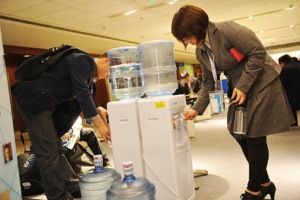News
Moaners and whingers poison the atmosphere in many workplaces
This article is more than 7 years old.
Many people experience others moaning at work, but few will admit to being ‘moaning minnies’ themselves

Bad vibes around the water cooler can lead to lower productivity (photo: Intel Free Press)
If a new opinion poll is to be believed, the work culture at many firms is dominated by complainers. Not only that, but their moaning has a negative effect on their colleagues, reports Metroxpress.
Figures gathered by Wilke for the Christian trade union Krifa show that more than three out of four people feel they have to listen and react to the moaning and whinging of their colleagues – and this has a negative effect on the listener as well as on productivity.
“People’s ability to perform is driven to a high degree by their engagement. So a lack of motivation at work affects our productivity,” commented employment psychologist Lars Ginnerup.
Moaning takes several forms
However, there are different kinds of moaning – over things we can’t change and over things that can be changed, and it is important to differentiate between the two.
“Moaning is almost always a sign of frustration over a lack of control. For many people it can also be a way of avoiding responsibility, as in: ‘Now I’ve said it, so it’s out of my hands’,” said Ginnerup.
Ginnerup also points out that teams at work have an emotional balance and ideally there ought to be three times as many positive feelings as negative ones.
More self-awareness needed
Krifa’s own employment psychologist, Rasmus Højbæk, expressed surprise at how few people in the study showed awareness of how much they moaned.
“The figures show that Danes lack self-awareness when it comes to how much they complain,” he said.
“It is important that you take responsibility for your own moaning. You have to make up your mind why you are moaning, because moaning is not just moaning – it is a reaction against some form of not thriving.”










































